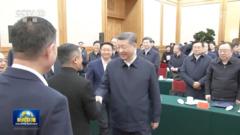The Asian tech world is buzzing with the return of Jack Ma, the charismatic founder of Alibaba. After largely disappearing from the public eye, Ma was spotted at an exclusive meeting with Chinese President Xi Jinping and top business leaders, igniting discussions about what this could mean for China’s tech industry and economy.
Ma withdrew from public life following his critical remarks about China’s financial sector in 2020, which many believe struck a nerve with the government. His reemergence has led to a notable rally in tech stocks, especially Alibaba's, which saw shares soar by over 60% this year and reported better-than-expected financial results shortly after the event.
Media pundits emphasize how Ma's seat in the front row and his handshake with Xi signal a softening of the policies that were once harsh towards him. Social media has celebrated his return, with many saying it could be a boost for China's economy.
Xi’s words at the meeting were equally intriguing, hinting at a time for private enterprises to flourish, fostering hope for a potential shift away from the previous crackdown on the tech sector, which negatively affected companies far and wide.
While Ma's presence is seen as a positive move, he was notably not a speaker at the event, leaving some analysts cautious about the extent of his reintegration into China’s business elite. They suggest that while this may indicate a controlled re-engagement, it doesn't signal complete freedom from government scrutiny.
In recent times, Chinese tech sectors have faced increased regulation and restrictions, especially following Ma's outspoken criticisms. Many believe his return signals a desire from the government for innovation in light of new challenges, such as the global rise of Chinese-developed AI technologies like DeepSeek.
With these developments, analysts are looking at a new potential focus on innovation and high-quality growth, reflecting a desire to shift priorities towards more advanced industries. As the landscape evolves, Ma's comeback could mark the beginning of a new chapter for China’s tech sector—provided that private firms can align with government priorities while retaining their entrepreneurial spirit.
Ma withdrew from public life following his critical remarks about China’s financial sector in 2020, which many believe struck a nerve with the government. His reemergence has led to a notable rally in tech stocks, especially Alibaba's, which saw shares soar by over 60% this year and reported better-than-expected financial results shortly after the event.
Media pundits emphasize how Ma's seat in the front row and his handshake with Xi signal a softening of the policies that were once harsh towards him. Social media has celebrated his return, with many saying it could be a boost for China's economy.
Xi’s words at the meeting were equally intriguing, hinting at a time for private enterprises to flourish, fostering hope for a potential shift away from the previous crackdown on the tech sector, which negatively affected companies far and wide.
While Ma's presence is seen as a positive move, he was notably not a speaker at the event, leaving some analysts cautious about the extent of his reintegration into China’s business elite. They suggest that while this may indicate a controlled re-engagement, it doesn't signal complete freedom from government scrutiny.
In recent times, Chinese tech sectors have faced increased regulation and restrictions, especially following Ma's outspoken criticisms. Many believe his return signals a desire from the government for innovation in light of new challenges, such as the global rise of Chinese-developed AI technologies like DeepSeek.
With these developments, analysts are looking at a new potential focus on innovation and high-quality growth, reflecting a desire to shift priorities towards more advanced industries. As the landscape evolves, Ma's comeback could mark the beginning of a new chapter for China’s tech sector—provided that private firms can align with government priorities while retaining their entrepreneurial spirit.


















